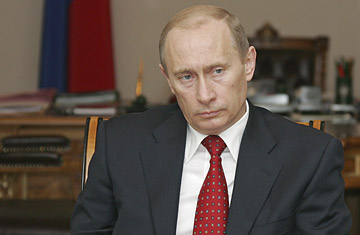
Russian President Vladimir Putin.
Wednesday's NATO summit in Bucharest may be remarkable for the presence of Russia's President Vladimir Putin, leader of the power against whose precursor the alliance was originally created. Moreover, Putin will follow the summit by taking its most powerful leader, President George W. Bush, back to his vacation home at the Black Sea resort of Sochi. But the formal bonhomie won't hide the escalating tension in the relationship between Washington and Moscow. President Bush on Tuesday strongly backed NATO membership bids by the former Soviet republics of Ukraine and Georgia, a move fiercely opposed by Moscow, which sees it as an effort to extend a geopolitical rival's presence to Russia's southern and southwestern frontiers. Although some European NATO members are reluctant to antagonize Russia by forging ahead with inducting Georgia and Ukraine, President Bush made clear that he backs the launch of the membership process for the two countries.
Whatever the state of their personal chemistry, then, Bush and Putin will engage each other over a widening chasm in the coming days. Besides NATO's expansion eastward, they also differ strongly over U.S. plans to deploy its missile defense system in the Czech Republic and Poland by 2012, ostensibly to intercept potential attacks from Iran. And Russia has been irked by the NATO powers' enabling of Kosovo's breakaway from Serbia, which Moscow deems illegal.
But Putin may have a compromise up his sleeve: If Russia's priority is to avoid Ukraine and Georgia being drawn into the NATO fold, a concession on the missile defense system may be part of the quid pro quo envisaged by the Russian president.
In 2004, Romania, Slovakia, Slovenia, Bulgaria, Latvia, Lithuania and Estonia joined NATO as a guarantee against encroachment by Moscow, which had dominated them from 1945 until the end of the Cold War. Back at the close of the Cold War in the early 1990s, NATO had promised Moscow that once Soviet troops withdrew from Eastern Europe, NATO would not expand beyond West Germany. Russians decry the West's broken word, and question the purpose of NATO's encircling them from the west and south. Ukraine's prospective NATO membership is particularly painful to Russia in terms of security and emotions: Ukraine is the site of Kievan Rus, the original state from which both Russia and Ukraine sprang. Russian historians traditionally referred to Kiev as "The Mother of Russian cities." As for Georgia, Moscow frets about what it sees as an encirclement in order to dismember Russia and grab its hydrocarbon and other riches. Most Russians are not yet ready even to come to terms with the idea of Georgia's independence.
Moscow has responded to the new alignments of its former satellites by using energy supplies for geopolitical leverage, and Putin threatened to aim nuclear missiles at Ukraine, the Czech Republic and Poland if they host the U.S. missile-defense system. Russia is also playing a cat-and-mouse game with Georgia: Early last month, Putin eased his blockade of the country and resumed air and sea transportation links, severed in October 2006 over the arrest of Russian personnel by the Georgians on suspicion of espionage. At the same time, Russia has invoked "the Kosovo precedent" to turn up the heat on Georgia by upgrading Moscow's ties with Georgia's breakaway provinces of Abkhazia and South Ossetia, falling just short of formally recognizing their independence.
Despite President Bush's support, however, prospects for Georgia and Ukraine's accession to NATO look bleak as long as key Western European powers such as Germany and France remain leery of antagonizing Russia, their major energy supplier. Accepting NATO's admission of tiny Croatia and making concessions on missile defenses might be Putin's offering by way of a sweetener for a compromise with President Bush. Last month, the Russian leader said he had received a letter from Bush that had helped achieve "final agreements" on some differences, and that now Russia and the U.S. were ready to complete the details.
Putin is keeping his options open, though. Last week, Russia's envoy to NATO, Dmitri Rogozin, said that the latest U.S. proposals on missile defense in Europe "do not satisfy our security requirements." That could simply be raising the ante in the bargaining process, but it also creates a fallback position should Putin fail to achieve his desired results on Georgia and Ukraine during the Bucharest summit.
Also weighing against the new accessions to NATO are opinion polls showing that 58% of Ukrainians are opposed to joining the alliance, and Georgia's internal troubles with its secessionist regions.
The ground may be fertile for a compromise simply because neither Moscow nor Washington is in a position to achieve all of its goals. Responsible Russian officials don't believe U.S. interceptors in Poland will threaten the deterrent power of Russian ICBMs that would travel over the North Pole, rather than westward. And Putin likely realizes that the U.S. is unlikely to be dissuaded from deploying missile defense in Europe, just as Bush is likely to discover that he will have trouble getting the necessary backing from Western European allies on admitting Georgia and Ukraine as long as Russia remains so strongly opposed.
Hence the appeal, for Putin at least, of a compromise accepting the presence of the missile shield on its borders in exchange for keeping its southern neighbors out of NATO. It remains to be seen, however, whether President Bush — who talked passionately on Tuesday about the need for NATO to admit Georgia and Ukraine — is ready to split the difference.
